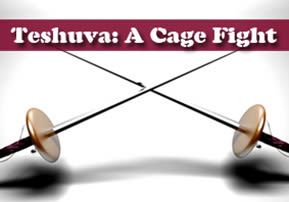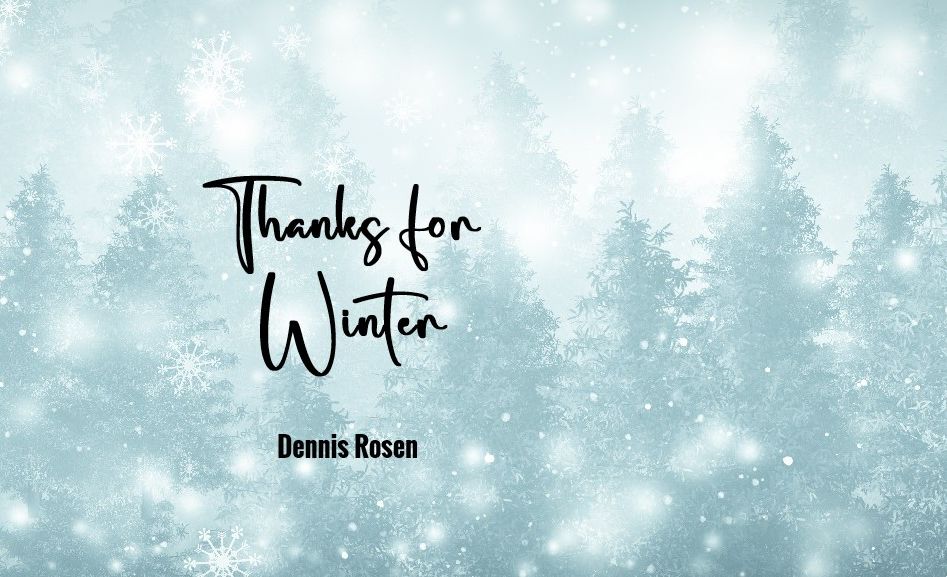
Teshuva: A Cage Fight
Teshuva is a little bit like a steel caged wrestling match. To train for the match, you make sure there are good men in your corner. Since you are fighting the good fight...

Teshuva: A Cage Fight, Part 1
Teshuva is a little bit like a steel caged wrestling match. To train for the match, you make sure there are good men in your corner. Since you are fighting the  good fight, you have thousands of fans rooting for you. Your companion in the ring is your will to fight. However, once the cage door shuts, and the bell rings, you are all alone. It is just you and your opponent. There is no one there to protect you from the other guy who is bent on smashing your face.
good fight, you have thousands of fans rooting for you. Your companion in the ring is your will to fight. However, once the cage door shuts, and the bell rings, you are all alone. It is just you and your opponent. There is no one there to protect you from the other guy who is bent on smashing your face.
 good fight, you have thousands of fans rooting for you. Your companion in the ring is your will to fight. However, once the cage door shuts, and the bell rings, you are all alone. It is just you and your opponent. There is no one there to protect you from the other guy who is bent on smashing your face.
good fight, you have thousands of fans rooting for you. Your companion in the ring is your will to fight. However, once the cage door shuts, and the bell rings, you are all alone. It is just you and your opponent. There is no one there to protect you from the other guy who is bent on smashing your face. When we combat our inclination towards doing wrong (our yetzer hara), we have a lot going on in our corner. We have Rabbis who teach us day and night. They have published volumes and volumes of work that we can reference in battling our baser instincts. We learn what we can do to distance ourselves from all sorts of trouble. We also have within us a basic concept of right and wrong. Even if we aren’t learned in the laws of proper conduct, we all have moral beacons that instinctively tell us when our actions properly reflect what is right or not. Most important, Hashem is in our corner. He is always with us, urging us to defeat our inner demons and in the process, to draw our souls closer to Him.
Our opponent in the ring is our own desires. They are always there, waiting to tempt us into misdeeds. We are all engaged in an ongoing spiritual fight to the death. For each battle in this fight, the stakes are immense. Don’t underestimate this conflict of metaphysical forces simply because you don’t see it as that serious an issue. We are put on this earth to bring our souls closer to Hashem. The Satan, or Evil Inclination, within us, is commanded with the task of making sure that doesn’t happen. Every day, there are hundreds of battles we fight to embolden our soul over the body, bring light to the earth, and make the world a better place.
These battles are not the super-hyped fights you see on HBO. They are all very subtle. Every time you are talking about someone and you have the urge to start gossiping, the battle has begun. Every time you wish to stay in bed when you should be reciting morning prayers or getting up to start the day, the battle has begun. Every time you walk on the street and your peripheral vision sees the contours of a really sexy woman, and all you want to do is raise your head and just get a little peek of this sexy creature rather than visually focus on something like the tip of your nose, the battle has begun. The spiritual stakes for every single conflict are a matter of life and death. Worse even. As Rabbi Lazer Brody has stated, a body is here on this earth for 70 to 80 years (as alluded to in Psalm 81), the soul is eternal. Any damage to the body is temporary because our physical bodies are temporary. Sins such as slandering someone or misusing the eyes G-d gave you to poison yourself stain the soul and the soul is eternal.
Even on a physical level sins of this nature are very dangerous. Talking about lewd topics, checking out people for their physical appearance, and all of the actions that these things lead up to results in some very serious medical problems down the line. Rabbi Moshe ben Maimon, famously known as the Rambam estimates that up to 990 out of 1000 cases of all major diseases stem from recklessly spilling seed. The Rambam is generally known as one of the greatest physicians of the past 1000 years.
So as you can see, when it comes to the choices we make in how we deal with sexuality in our daily lives – our decisions are a matter of life and death.
Not just life and death to ourselves, but the physical and spiritual wellbeing of countless others hang in the balance of our daily actions.
Today, we all live very insulated lives. We can connect to the outside world through TV, internet, and cell-phone, without ever having to leave our homes. This lifestyle encourages the assumption that all of our actions only impact ourselves or our immediate family and friends. Even when we do positive things like Torah and Teshuva, we run the risk of feeling that these great acts only had a focused impact.
We need to realize that all of Yisrael is responsible for one another. That means that each individual mitzvah has a positive impact on every Jew, and each sin endangers all of us.
When we sin, we instinctively feel as if we our damaging our own little universe and nothing more. Why shouldn’t we? When we are up against temptation, we fight alone. When something bad happened to someone else, we read about it. The best we can do is empathize with the person. When something happens to us, we feel it personally. This difference makes us believe that our actions only affect our own existence.
This is not a Jewish value. It is very destructive in nature. At the very least, it devalues our own ability to make the world a better place.
It also implies that when we do right by ourselves. When we are honest. When we restrain our baser instincts, we aren’t really making a difference. The world around us has collaborated with the baser parts inside of us to fool us into thinking that marching on Washington changes the world, but praying doesn’t. It has fed us the devastating illusion that a check for $25,000 to UNICEF saves lives while avoiding an inappropriate site on the internet does nothing.
Again, this lie is a western myth. It couldn’t be further from the truth. It only empowers the dark forces around us whom are our opponents in the ring. The easiest way to justify a sinful act is to convince yourself that nobody is affected. If you can convince yourself that nobody else gets hurt by the things you do, it is easy to be convinced that there is nobody watching over you when you do these things.
We need to remember that there are millions of our brothers and sisters all over the world who are impacted by what you do. Billions of people across the planet are impacted by the spiritual deeds of Am Yisrael.
According to Jewish law, a simple act of teshuva has the power to change the world just as much as any check to any organization or any march on Congress.
We can be dissuaded from this belief by what I call the fallacy of the act of nothing. When you defeat temptation, what you really doing? Tangibly, you are doing nothing. On the surface, the act of resisting sin is really an act of overcoming the desire to do something, even if it is something wrong. The net sum of overcoming desire is an act of nothing.
The lie distorts our false reality when we assume that if you do nothing, then nothing happens. This is nonsense. According to Rabbi Lazer Brody, there are three tenets to Jewish Faith. One, everything comes from Hashem. Two, everything Hashem does is good. Three, everything Hashem does is for our good – even if we don’t realize it. It is up to us to find out what G-d is communicating to us with everything that happens.
When we perform an act of, ‘nothing’, and resist the urge to do something, then something will happen. It can be an immediate reward like waking up the next morning and finding out your wife cooked you breakfast. It can be a long term reward, like something you see 10 years from now – or a blessing to your children. It can be something very wonderful, more wonderful than we humans are capable of perceiving, that awaits us in the next world.
You think nobody knows what you just resisted? You think that nothing was recorded in Heaven on your behalf? Or on behalf of the Jewish Nation? You think the monotony of life just continues like the previous moment? No. In this act of resisting temptation, you are metaphysically bringing intense light into the world. You are not acting in a vacuum. We never act in a vacuum!
To be continued.
Dovber Halevi is the author of the financial book, How to Survive the Coming Decade of Anxiety. He writes for Breslev Israel and The Middle East Magazine. He lives with his wife and two children in Eretz Yisrael.








Tell us what you think!
Thank you for your comment!
It will be published after approval by the Editor.